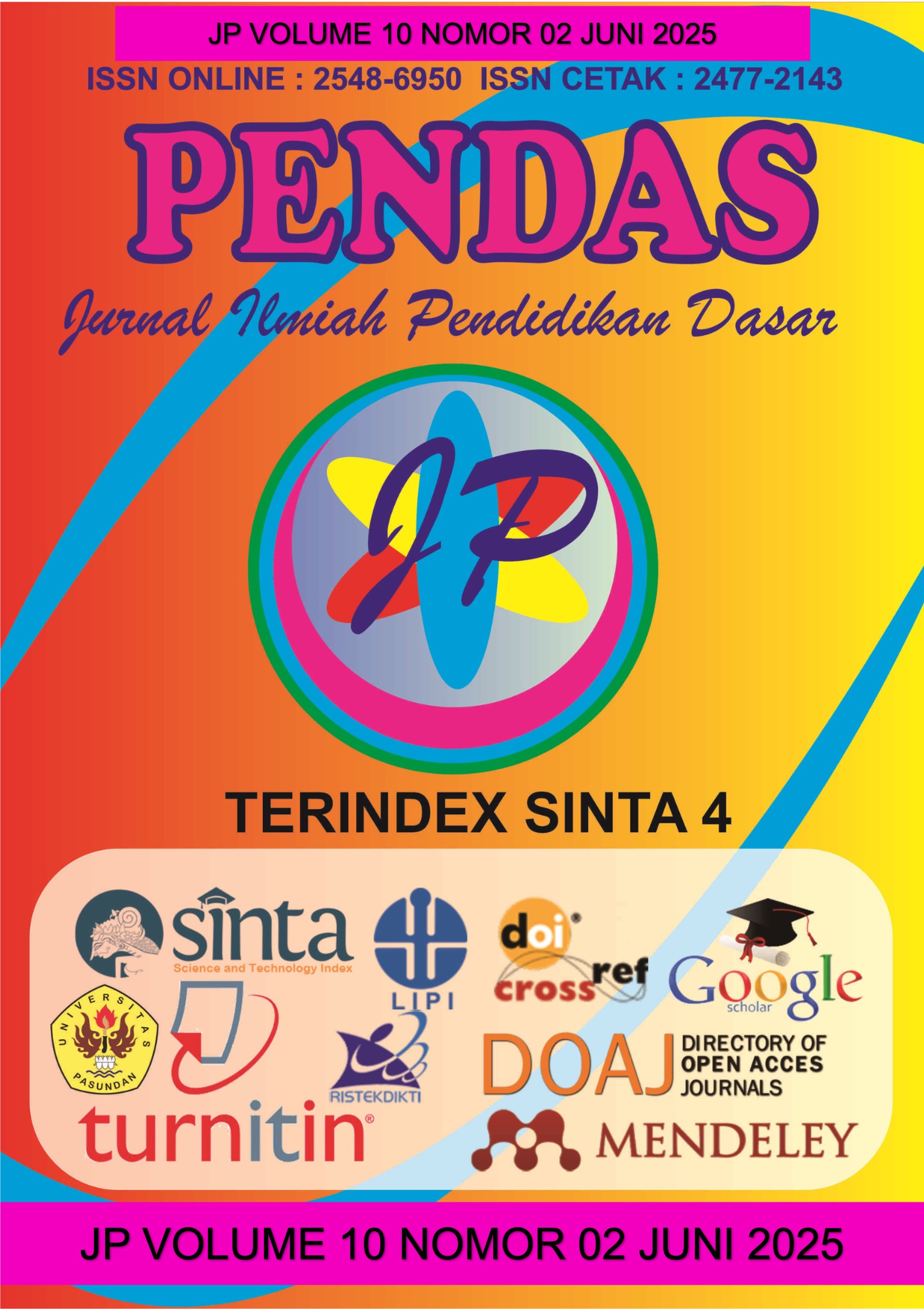PENGARUH PENERAPAN MODEL PEMBELAJARAN PROBLEM BASED LEARNING (PBL) BERBASIS VIDEO ANIMASI POWTOON DALAM MENINGKATKAN HASIL BELAJAR MATEMATIKA
DOI:
https://doi.org/10.23969/jp.v10i02.23920Keywords:
Problem Based Learning (PBL), Powtoon, Learning OutcomesAbstract
The problem in this research is the low mathematics learning outcomes of SDN 6 Tambun students, especially in the fraction aspect. To address this issue, the author conducted a study by implementing the Problem Based Learning (PBL) model using Powtoon animated videos in the learning process. The objectives of this study are (1) to determine the implementation of the Problem Based Learning (PBL) model based on Powtoon animated video media in teaching mathematics to second-grade students at SDN 6 Tambun, (2) to assess the mathematics learning outcomes of first-grade students at SDN 6 Tambun, and (3) to analyze whether there is an effect of implementing the Problem Based Learning (PBL) model using Powtoon animated videos on the mathematics learning outcomes of second-grade students at SDN 6 Tambun. This research employs a quantitative pre-experimental design (one-group pretest-posttest design). The study uses observation sheets and learning outcome tests as instruments, with a research sample of 19 students. The sample was selected using a purposive sampling technique. Data analysis was performed using the Paired Sample t-test. The results of this study indicate a probability value of 0.00, which is <0.025, leading to the conclusion that Ho is rejected and Ha is accepted. The positive implication of applying this model with integrated media is that teachers can consider incorporating technology and multimedia into their teaching strategies to enhance student engagement and understanding.
Keywords: Problem Based Learning (PBL), Powtoon, Learning Outcomes
Downloads
References
Amalia, M. C., Subekti, E. E., & Untari, M. F. A. (2022). Pengaruh model pembelajaran savi dengan media powtoon terhadap hasil belajar siswa kelas v sdn Kabongan kidul rembang. Pendidikan Dasar Dan Pengembangan, 3(4), 471–478. https://jurnal.unipasby.ac.id.index.php/jurnal_buana_pendidikan/article/view/2719
Asrifah, S., & Arif, A. (2020). Pengaruh penggunaan model pembelajaran problem based learning terhadap hasil belajar pendidikan pancasila dan kewarganegaraan siswa kelas V sdn Pondok pinang 05. Pendidikan, 16(30), 183–193. https://doi.org/https://doi.org/10.36456/bp.vol16.no30.a2719
Azani, A., Sarmila, & Gusmaneli. (2024). Hakikat Belajar dan Pembelajaran. Mutiara Jurnal Penelitian Dan Karya Ilmiah, 2(3), 17–37. https://doi.org/10.59059/mutiara.v2i3.1183
Azhar. (2022). PENGEMBANGAN KURIKULUM PENDIDIKAN AGAMA ISLAM BERBASIS BUDAYA RILIGIUS DI SEKOLAH. FITRAH International Islamic Education Journal, 4(2), 106–122. https://doi.org/10.22373/fitrah.v4i2.2329
Babu, S. S. (2022). MATHEMATICS TEACHING AT VARIOUS LEVELS IN SCHOOL: PRACTICES AND PROBLEMS. PARIPEX INDIAN JOURNAL of RESEARCH, 56–58. https://doi.org/10.36106/paripex/7904615
Dhaka, V. S., Kumar, P., Devi, R. M., Kumar, R., Kumar, S., & Kumar, M. (2023). Mathematics as a Part of The Real Life. International Journal of Advanced Research in Science, Communication and Technology, 409–418. https://doi.org/10.48175/ijarsct-11665
Hamdani, A. D., Nurhafsah, N., & Rustini, T. (2022). Pengaruh Penerapan Model Problem Based Learning (PBL) dalam Pembelajaran IPS terhadap Kemampuan Berpikir Tingkat Tinggi (HOTS) pada Siswa Sekolah Dasar. Journal on Education/Journal on Education, 5(1), 460–468. https://doi.org/10.31004/joe.v5i1.620
Irawan, T., Dahlan, T., & Fitrianisah, F. (2023). ANALISIS PENGGUNAAN MEDIA VIDEO ANIMASI TERHADAP MOTIVASI BELAJAR SISWA DI SEKOLAH DASAR. Didaktik Jurnal Ilmiah PGSD STKIP Subang, 7(01), 212–225. https://doi.org/10.36989/didaktik.v7i01.738
Kurniawati, R. P., & Dayu, D. P. kusuma. (2023). Pengaruh media powtoon berbasis problem based learning terhadap hasil belajar matematika siswa kelas IV SD. Pendas : Jurnal Ilmiah Pendidikan Dasar, 08(01), 5191–5200. https://doi.org/10.23969/jp.v8i1.8606
Monika, bala, J., & Sunita. (2023). Scope and Challenges of Multimedia in Education Sector. International Journal for Multidisciplinary Research, 5(3). https://doi.org/10.36948/ijfmr.2023.v05i03.3868
Nurfalah, E., Yuliastuti, R., Rahayu, P., Sulistyaningrum, H., & Surawan. (2021). Assessing the effectiveness of using digital mathematics technology on student mathematics learning. Journal of Physics: Conference Series, 1776(1), 012008. https://doi.org/10.1088/1742-6596/1776/1/012008
Purbaningrum, M., Ramadhan, S., & Thauzahra, R. (2023). Why is Math Difficult? : Beliefs That Affecting Students’ Mathematics Skills. Jurnal Paedagogy : Jurnal Penelitian Dan Pengembangan, 10(4), 1000–1000. https://doi.org/10.33394/jp.v10i4.8652
Shavkidinova, D., Suyunova, F., & Kholdarova, J. (2023). EDUCATION IS AN IMPORTANT FACTOR IN HUMAN AND COUNTRY DEVELOPMENT. CURRENT RESEARCH JOURNAL of PEDAGOGICS, 04(01), 27–34. https://doi.org/10.37547/pedagogics-crjp-04-01-04
Sugihati, Y., Nurwahidin, M., Herlinawati , & Firdaus, R. (2024). Development of Powtoon-Based Learning Videos to Improve Learning Outcomes in Siroh Subjects at Markazur Quraan Baitun Najaah. Jurnal Teknologi Pendidikan Jurnal Penelitian Dan Pengembangan Pembelajaran, 9(3), 452–452. https://doi.org/10.33394/jtp.v9i3.11613
Sundaram K., M. (2021). National Education Policy 1986 Vs National Education Policy 2020 – A Comparative Study. International Research Journal on Advanced Science Hub, 2(Special Issue ICAMET 10S), 127–131. https://doi.org/10.47392/irjash.2020.210
Suprapmanto, J., Yathroh, I. L., Handayani, F., Sari, N. P., & Salwa, S. (2024). Utilisation of Powtoon Platform as Learning Media and Improving Student Achievement. World Psychology, 3(1), 113–127. https://doi.org/10.55849/wp.v3i1.608
Wahyudi , Yahya, M. D., Jenuri , Susilo, C. B., Suwarma, D. M., & Veza, O. (2023). Hubungan Penggunaan Multimedia dalam Pembelajaran terhadap Peningkatan Hasil Belajar Peserta Didik. Journal on Education, 6(1), 25–34. https://doi.org/10.31004/joe.v6i1.2910
Downloads
Published
Issue
Section
License
Copyright (c) 2025 Pendas : Jurnal Ilmiah Pendidikan Dasar

This work is licensed under a Creative Commons Attribution 4.0 International License.














































